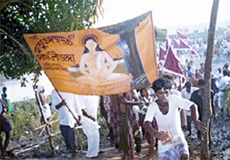Matua
Matua a local Hindu religious sect founded by harichand thakur of Gopalganj. The word 'matua' means to be absorbed or remain absorbed in meditation, specifically to be absorbed in the meditation of the divine.
The Matua sect is monotheist. It does not follow Vedic rituals, and singing hymns in praise of the deity is their way of prayer and meditation. They believe that salvation lies in faith and devotion. Their ultimate objective is to attain truth through meditation and worship. They believe that love is the only way to understand God. The Matua have no distinctions of caste, creed, or class. They believe that everyone is a child of God.

The Matua believe that males and females are equal. They discourage early marriage. Widow remarriage is allowed. They refer to their religious teachers as 'gonsai;' both men and women can be gonsai. The community observes Wednesday as the day of communal worship.
The gathering, which is called 'Hari Sabha' (the assembly of Hari), is an occasion for the Matua to sing kirtan in praise of Hari till they almost fall senseless. musical instruments such as jaydabka, kansar, conch, shibga, accompany the kirtan. The gonsai, garlanded with karanga (coconut shell) and carrying chhota, sticks about twenty inches long, and red flags with white patches, lead the singing.
Shrishriharililamrta is a principal religious scripture of the Matua. Apart from praising Hari and meditating upon him, the Matua believe in kindness to all creatures. In order to stress the importance of all living creatures and the equality of all life. Matua ideas are expressed in the following lines of verse:
Hari dhyan Hari jvan Hari nam
Premete matoyara matuya nam
Jibe daya name ruchi manusete
Iha chhada ar yata sab kriya
Kukurer prasad pele khai
Veda-bidhi shauchachar nahi mani tai.
The Matuas are there in Bangladesh and west bengal. Their principal temple is at Orakandi in gopalganj, where a fair is held every year on the 13th day of the lunar month in Falgun, on the birth anniversary of Harichand Thakur. Thousands of devotees gather on the occasions, bringing rice, lentils, and vegetables as token of their devotion and love. [Monoranjan Ghosh]
See also matua sangit.
